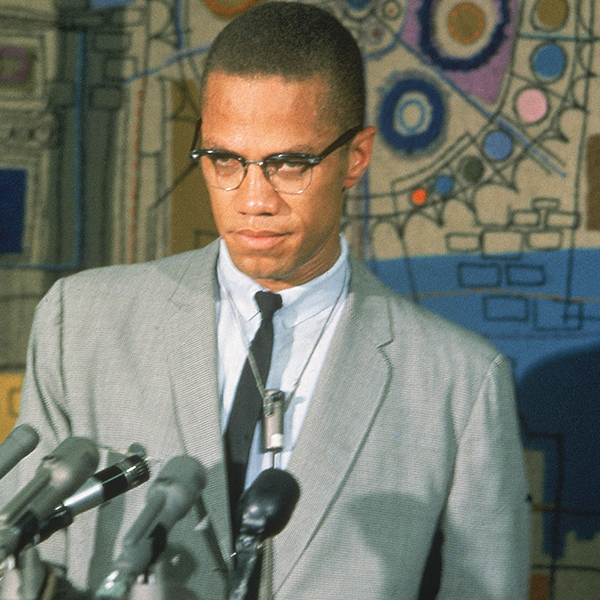By Earl Ofari Hutchinson
Contributing Columnist
Happy birthday, Malcolm X.
May 19 would have been his 96th birthday. That’s the good news.
Here’s the bad news. Despite his age and significance and recognition as one of America’s greatest social change agents, there is still no large thoroughfare in Los Angeles named in his honor. It’s not for lack of trying.
In the decades following his untimely death on Feb. 21, 1965, at the Audubon Ballroom in New York, Boston, New York, Dallas and Washington, D.C. have named major thoroughfares after him. Los Angeles has named a way after him. That’s welcome. However, it’s not a major thoroughfare.
There have been countless efforts and voices raised over the years by activists, political and religious leaders, educators and legions of community residents for a Malcolm X Street, or Malcolm X Boulevard. During those decades of inaction on a street to honor him, Los Angeles city and county officials have renamed and redesignated dozens of streets after individuals, some known, some barely known and some unknown to most city residents.
The same goes for the renaming of schools, parks, public buildings, freeways and the placement of plaques in neighborhoods. Again, there’s been nothing in Malcolm X’s name. Generations of school children have grown up hearing stories, tales and discussions about Brother Malcolm. They have watched movies, documentaries and slide presentations on his life and work.
They have heard poets and musicians pen lyrics in praise of him. They have read an endless number of books and articles that chronicle his life, dissecting his ideas and philosophy and recounting the visionary and inspirational impact his ideas and activism have had and continue to have on millions globally.
Unfortunately, in the decades since his death, they have also heard the lies, slanders, distortions and vilification of Malcolm X. He has been called a hate monger, a racist, a civil rights antagonist.
Many younger persons have little frame of reference to expose the hit job on him as the pithy falsehoods that they are. The lies about him often hang in the air and contaminate the learning process about his life and work, and their importance to today’s struggles.
He was the trendsetter in challenging the police murders of Blacks, in demanding Black political and economic empowerment, in the staunch support of African unity and advocating intense study and recognition of the profound importance of the African-American history of struggle and achievement.
In the last decade, the nation has had a proverbial long overdue day of recognizing its past, both positive and negative. First, there’s the negative.
An endless number of monuments, schools, streets, parks and public buildings, nationally, that were named after shameful, disgraceful and hateful champions of white supremacy and treason have been renamed. Often, the renaming has come after an intense campaign to expose their racist history and actions and educate the public on why exorcising their name from the books is important.
There’s the flip side to this, the positive. Their names have been replaced by men and women who made solid contributions to the fight for social justice.
This has certainly been the case in Los Angeles. Hispanic, Asian and African-American noted figures who have led the fight for civil rights and social justice have been honored with their names on streets, schools, parks and public buildings.
This is not simply a feel-good or academic exercise in honoring someone from a by-gone past, or mere symbolism. The name changes provide an ongoing teaching moment for young persons, generations removed from the intense period of civil rights activism of the past, about that past and how it continues to provide rich and fruitful lessons for the present.
A Los Angeles street named after Malcolm X would accomplish that end. But it would do much more for the city. It would recognize his towering accomplishments and the deep impact he made on America.
It would make Los Angeles one of several other cities that have a street that bears his name. It would pay homage to the crucial but much-ignored role that African-American culture, art, and politics have played in the growth and development of Los Angeles.
It would be an eternal reminder to young people of the powerful heritage, history and tradition of the Black struggle in America and Los Angeles.
In 1999, the U.S. Postal Service issued a commemorative Malcolm X stamp. That literally and justifiably placed the stamp of approval on Malcolm X as a true American hero. That should have ended any debate or reservation about Malcolm X’s role in the pantheon of the nation’s civil rights champions.
Malcolm X is truly a man for the ages. His birthday is May 19. The best birthday gift Los Angeles can give him on his birthday is to name a street in his honor. Happy Birthday, Malcolm.
Earl Ofari Hutchinson is an author and political analyst. His latest book is “Why Black Lives Do Matter” (Middle Passage Press). He also is the host of the weekly Hutchinson Report on KPFK 90.7 FM Los Angeles and the Pacifica Network.












